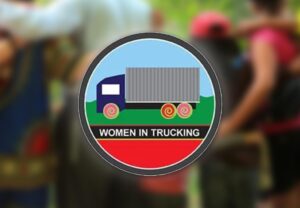Convention has it that little boys play with trucks and little girls play with dolls – and those toys help form their interests as they grow up into men and women. Today’s society generally teaches both genders from an early age that they “be anything they want to be” and pursue a career in any profession. Such opportunity doesn’t come without its obstacles though, particularly if you’re a woman pursuing a field that is historically for men.
The transportation industry is certainly one that has long been male-dominated, both in perception and fact, despite some notable exceptions by pioneering women over the years. Take for example, AGT Global Logistics founded by Angela Eliacostas. Angela was an Influential Woman In Trucking award recipient and her company consistently nominated as the Top Companies for Women to Work for in Transportation by the Women In Trucking Association. You can check out Angela’s story here, and thankfully there are many more like hers throughout the nation!
Despite the success stories, there are certainly benefits and challenges to working as a female in the trucking and transportation industry.
Benefits of a Career in Trucking
- Stable income
- Minimal to no pay gap between women and men
- Travel opportunities
- Skill development
- Significant career and business growth opportunities
Challenges of a Trucking Career as a Female
- Workplace and training gender bias
- Safety
- Health and wellness considerations
- Lack of early exposure to trucking career opportunities and training
- Equipment, cab-size
- Parenting when on-the-road
Organizations like the Women in Trucking Association are working hard to change the landscape and outlook for women in transportation. This non-profit organization with a mission to encourage the employment of women in the trucking industry and promote their accomplishments has fought to break through the gender stereotypes and obstacles that have kept women from joining – or even considering – a commercial driving career.
“The mission of the Women In Trucking Association is to address these challenges for women and to level the playing field so women can not only thrive, but find success behind the wheel of a truck,” said Ellen Voie, the association’s Founder. “By creating a safer and more family friendly workplace, we can attract more women to transportation careers and continue to increase the numbers of female professional drivers.”
There has been a well-established shortage of drivers for the past 20 years and many women have stepped up to fill the gap. Women made up almost 14% of professional drivers in 2022, almost double the 7.9% of female truck drivers in 2018. Associations like Women in Truckinghave helped move the needle by fostering recruiting, retention, and growth for women drivers, technicians, and executives in the commercial transportation and logistics industry, especially younger women or those who are switching careers [Source:CNBC].
Since professional truck drivers are paid based on the number of miles driven, there is no pay gap between men and women, and many female drivers log more miles than men, increasing their annual income. However, despite the steady demand for more drivers and although women maintain a lower accident ratio and longer tenure average than men, there still exists a common struggle for women to get hired at trucking companies. A New York Times article in 2023 reported that some truck driving companies had training policies that prevented women from even being considered. These companies utilized exclusive same-sex training practices, which meant that if a trucking company did not have any women available to train new female hires, candidates would simply not get the opportunity, despite their skills and experience.
Of course, the gender gap extends well beyond the truck driving profession, but the data in the commercial transportation industry is telling. The trucking industry is significantly lacking in gender diversity. According to the 2023 WIT Index, released by the Women In Trucking Association (WIT), “an average 12.1% of overall professional drivers who hold commercial driver’s licenses (CDLs) and drive heavy-duty trucks are female.” Logistics organizations note that some of the issues inhibiting women from entering the trucking industry go beyond gender discrimination. Women may hesitate to consider the trucking profession because they worry about safety during long-haul drives, at truck stops or rest areas, and reports of harassment on the job. The other obstacles are many, ranging from how cabs are outfitted for the male physique, to concerns about health and wellness, to difficulties striking a work-life balance, especially as a parent on the road.
If the transportation and logistics industry is serious about creating equal opportunities for women in trucking, it must address these issues and direct itself towards the cultural shift required to make lasting change. It’s vital that women working in trucking as drivers, trainers, and managers feel safe and respected, and that businesses take proper precautions to protect all employees from gender discrimination in the workplace.
Alter Marketing – a female-founded and led company – is passionate about creating an environment where women and men are empowered to do their best work. We’re realistic about the many hurdles women have to go through in the transportation industry and beyond and are committed to supporting organizations that drive change. Let’s alter the narrative and make the trucking and logistics field one of equal opportunity and diversity! If you’re a woman interested in trucking, please check out the resources below. Everyone can and should have the opportunity to enjoy the many benefits of a career in transportation!









